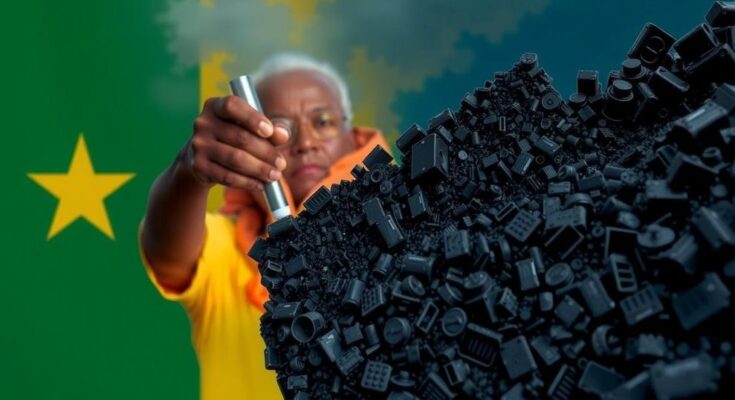Ghana’s illegal mining sector, known as “galamsey,” poses significant environmental and economic challenges, influencing the upcoming presidential election. The crisis, driven by unemployment and poverty, exacerbates land degradation, water pollution, and impacts agriculture, particularly cocoa production. The ruling party’s failure to curb these practices has led to public outcry and demands for sustainable solutions from political candidates, framing the election as a crucial opportunity for change.
In Ghana, the boom in illegal mining, known locally as “galamsey,” has not only transformed the landscape but is now significantly influencing the upcoming presidential election. Miners, despite the environmental degradation caused by their activities, continue their work in search of gold in harsh conditions. The ruling New Patriotic Party (NPP) candidate, Vice President Mahamudu Bawumia, faces opposition from former President John Mahama of the National Democratic Congress (NDC). As voters prepare to elect their next leader, the impacts of illegal mining have emerged as a critical issue, highlighting the intersection of economy, environment, and governance.
The illegal mining sector is largely driven by high unemployment and poverty levels, forcing individuals like Frank, a local miner, to risk their lives for an income that often mirrors that of more stable professions. Nearly 40 percent of Ghana’s gold production stems from illegal mining, which employs over one million citizens, primarily young men. However, this industry has destructive consequences, leading to deforestation, soil erosion, and water contamination, thereby threatening the livelihoods of many regions dependent on agriculture, particularly cocoa farming.
Ghana, recognized as the world’s sixth-largest gold exporter and second-largest cocoa producer, is currently grappling with the severe repercussions stemming from illegal mining. The expansive loss of farmland, alongside polluted rivers due to mercury and cyanide runoff, poses significant health risks to the population. Environmental advocates argue that governmental strategies have been insufficient, noting the lack of effective engagement with stakeholders to devise sustainable solutions.
The frustrations expressed by miners like Frank amplify the demand for government accountability, reflecting a broader sentiment among young voters who regard the ongoing environmental crisis as an indicator of systemic failures in governance. The NPP’s previous commitments to curb illegal mining have not been fulfilled, leading to public skepticism over political promises. Despite governmental interventions to combat illegal activities, critics highlight inconsistencies and inefficacies in enforcement efforts.
As Ghanaians head to the polls, the illegal mining crisis serves as a significant reminder of the urgent need for comprehensive strategies that prioritize sustainable practices over immediate financial gain. This election may present an opportunity for both miners and advocates to press for a shift towards responsible mining practices; a shift that could ultimately protect Ghana’s environment and promote long-term economic stability.
The issue of illegal mining in Ghana, referred to as “galamsey,” has escalated into a multifaceted crisis intertwining environmental degradation with socioeconomic challenges. This phenomenon has surged alongside rising gold prices and rampant youth unemployment, compelling individuals to engage in activities that contribute to serious ecological damage. The upcoming presidential election serves as a platform where these concerns may influence voter decisions, particularly among the younger population who feel the political system has failed to address their plight. The government promised to tackle illegal mining practices in 2017; however, the situation has only worsened, leading to community outcry for sustainable job creation and better management of resources. Ghana’s natural resources, including cocoa, face threats from the unregulated mining sector, raising alarms not only for environmentalists but also for citizens reliant on these industries for their livelihoods.
In summary, Ghana’s illegal mining crisis is not only an environmental catastrophe but also a pivotal issue that may determine the outcome of the upcoming presidential election. As miners and environmental advocates alike confront the repercussions of inadequate policies, the need for a holistic approach to address the intertwined challenges of unemployment and environmental sustainability becomes increasingly urgent. The election could represent a crucial turning point for both the industry and the nation, as citizens seek leadership that prioritizes long-term solutions over short-term profits.
Original Source: www.france24.com




